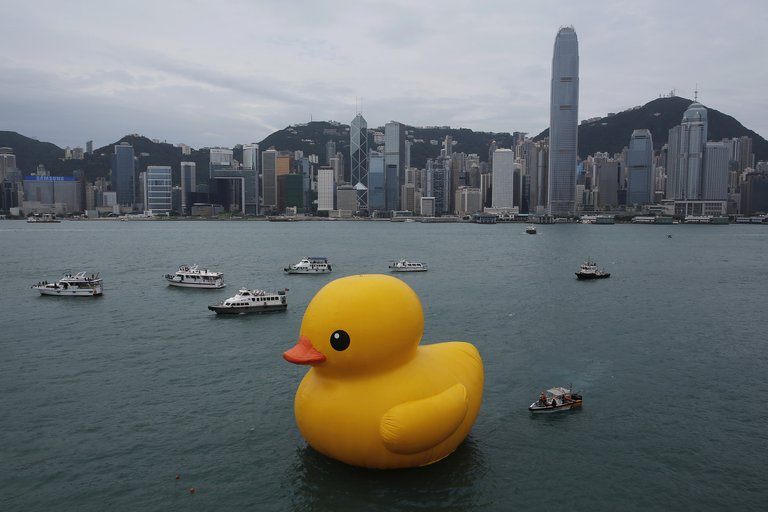
As far as dual identities go, the combination of Hongkonger and Canadian is not uncommon: there are over half a million Hong Kong Canadians (including former Governor General Adrienne Clarkson) and 300,000 Canadians in Hong Kong (a majority of entertainers). Ergo, when July 1st rolls around, it's dually significant: the anniversary of the Retrocession of Hong Kong in 1997 and anniversary of the Canadian Confederation in 2017.
This year is even more significant, because the anniversaries happen to be a pattern that human brains love, a multiple of five: it's Hong Kong's 20th (re)birthday, and Canada's 150th.
The pride and celebration is obvious, but this is a great time to reflect the progress so far and what holds for the future. There is a lot in common, and I'm not talking about the giant rubber duck that the government invited with taxpayer money to make people smile. I'm talking about a tale of two systems in one country.

Toronto apparently got a fake one, but t'is a tale for another time.
You can't talk about Hong Kong without talking about One Country Two Systems (一國兩制). It was the modern solution to a colonial problem. When the Great Britannian Empire acquired what became the Crown Colony of Hong Kong, parts of it were as a war prize (like Gibraltar) and other parts were a 99-year lease (like Weihaiwei). The 1842 and 1860 unequal treaties were for keeps; the 1898 convention was the lease.
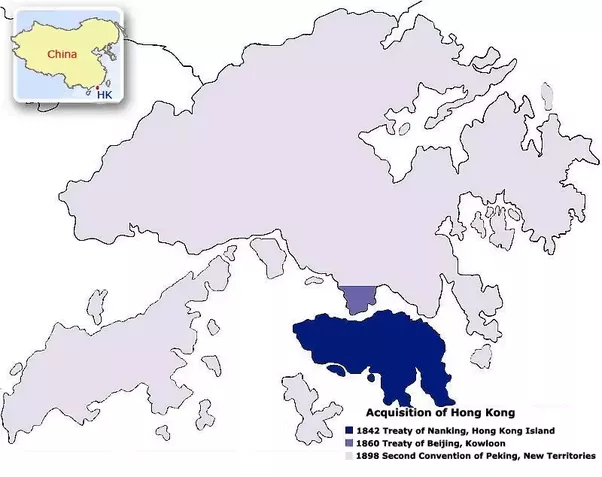
Why 99 years? The British in their infinite foresight and wisdom assumed 99 years was as good as forever. Well...
By the start of the 1980s, the markets in Hong Kong were starting to get nervous about what would happen after 1997, and the British finally realized that forever was happening very soon. With confidence at a high after the 1982 Falklands War, the British tried to persuade China to extend the lease by some complicated legal acrobatics. China would have none of it, and told its tenant that the lease expires 11:59 on June 30th, 1997. And if they don't leave, somebody gonna get a hurt real bad. The British asked the Chinese promise to keep Hong Kong's status quo for 50 years, and China agreed, signing the 1984 Sino-British Joint Declaration.
As soon as their meeting with the British was over, China proceeded to amend Article 31 of the Constitution of the People's Republic of China (PRC) to include Special Administrative Regions (SAR), an idea borrowed from the Republic of China (ROC) — especially ironic since the PRC is offering reunification with the ROC by granting Taiwan this SAR status. One Country Two Systems was born.
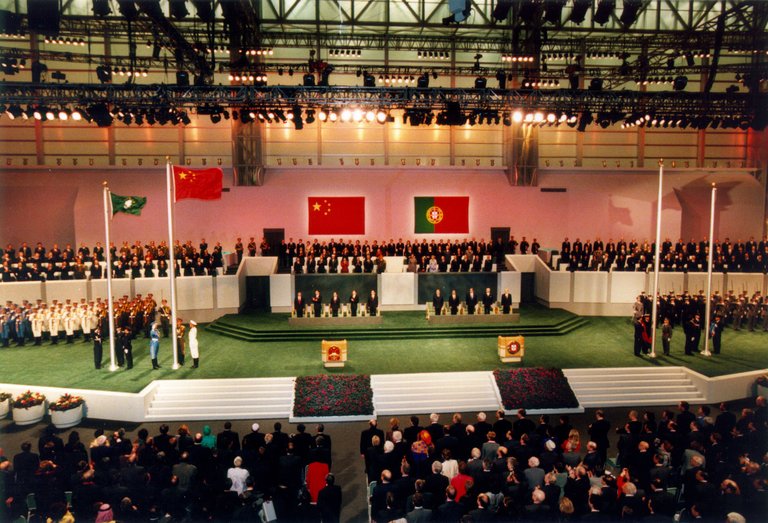
And they copy & pasted the same deal with Portugal for the Retrocession of Macau.
The concept of One Country Two Systems is tied to the principle of governance of a SAR, for a SAR is for all intents and purposes a country within a country. Although Hong Kong makes headlines in the West for its erosion of democracy and the slow take-over of China, the reality is that Hong Kong SAR today has much more powers and rights than other countries within countries, such as Scotland (in the UK) or "Indian" Reserves (in Canada and the USA).
The unequal treaties signed by the Chinese are well known in Hong Kong and China. How much do the Canadians know about the unequal treaties signed by the original Canadians and Americans? The British had no hope assimilating or killing all the Chinese to 'civilize' Hong Kong, but what happened to the Aboriginal (First Nations) people in Canada and the United States?
The aboriginal populations were decimated by disease due to the Columbian Exchange, and later forcefully removed and contained by the governments of the USA and British North America (proto-Canada). While historically the conquest and subjugation of the "Indians" was more brutal in the United States compared to in Canada, it's not like the native people have it easier. Most of Canada is celebrating Canada 150, but not all Canadians.
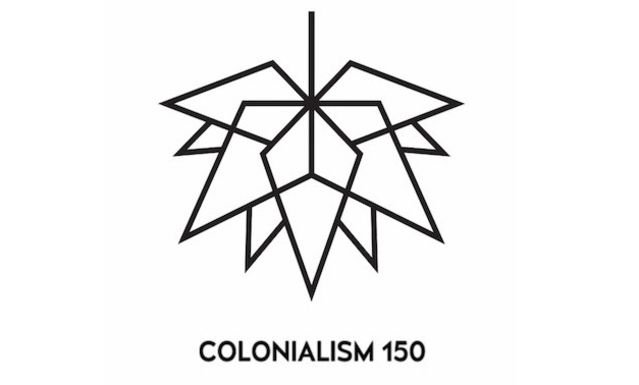
Despite a brutal history, the US natives have more control and sovereignty over their tribal lands compared to their Canadian counterparts. The USA itself is technically a union of 50 "countries" and within these lands are sovereign lands that are administered by Native Americans. Although the Bureau of Indian Affairs governs top level interactions (aka the highest sovereign authority), the US federal government has very limited day-today jurisdiction over Native Reservations. This is not the case with Canada, where the Canadian federal government is more involved with the governance of Native Reservations. Though there aren't any major clashes between US and Native Americans after the conclusion of the US-Indian Wars, there have been serious incidents between Canada and the First Nations, such as the 1990 Oka Crisis:
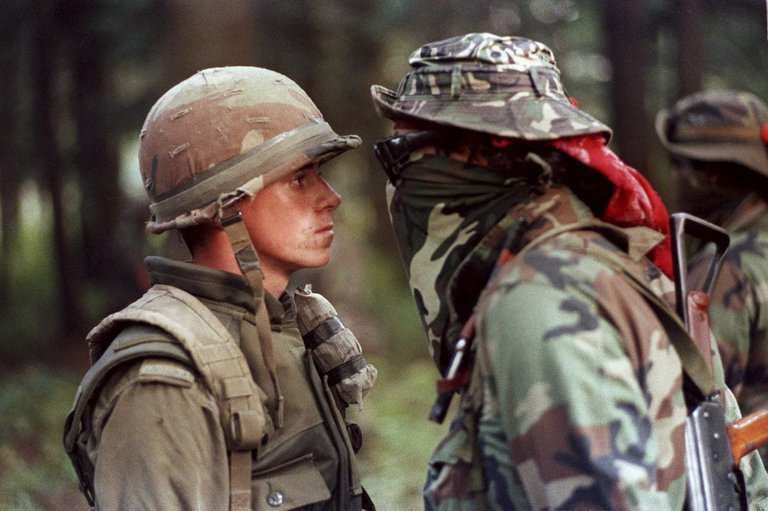
Canada has committed many resources to First Nations people in the form of subsidies and affirmative actions. It obviously is not working. First Nations people have similar issues as Black Americans: they are treated as losers and raised to think they are losers. If at a young age a child cannot equate his people with success, could you reasonably expect this child to grow up successfully? What good are all those subsidies and affirmative action for business and higher education if they don't make it that far?
Feeling sorry is not enough. Reconciliation commissions are not enough. There are almost as many First Nations people in Canada as there are Canadians in Hong Kong. This is wasted potential, for the First Nations and for Canada.
Canada may perhaps take a page out of both the Chinese and American playbooks. Perhaps Native Reservations should treated by law and in reality as one country two systems. In this day and age, when all you need is a laptop, stable power, and stable internet to make money, there are much more opportunities for sovereign First Nations Reservations than just casinos. Imagine Canada 200... celebrating the rejuvenation of the First Nations people, lead by the world's first major implementation of cryptocurrency in a real-world economy, made possible by the special legal jurisdiction of First Nations SARs and their ability to enact independent governance and regulations. Now that would be worth celebrating.